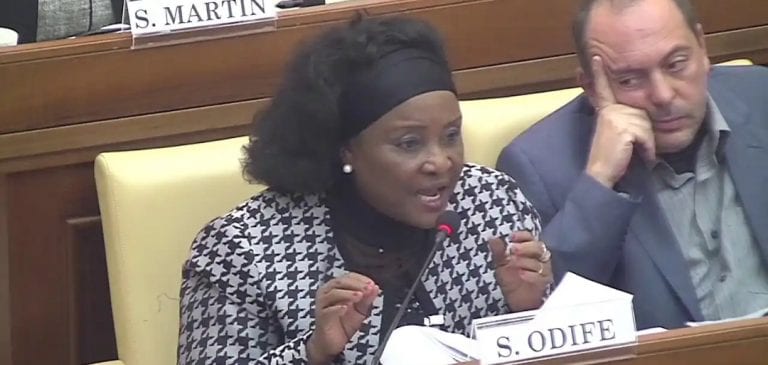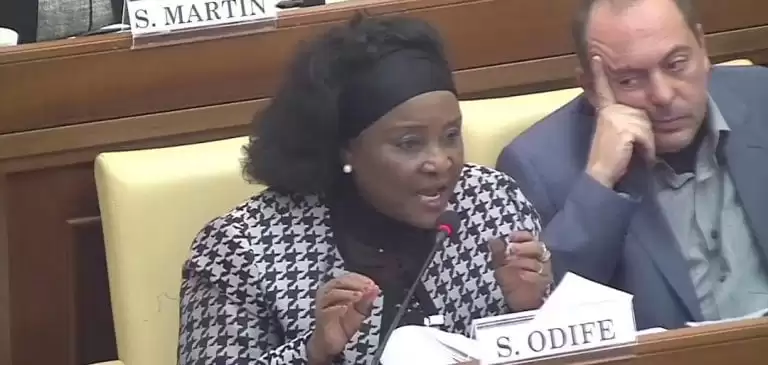

Last updated on September 11th, 2021 at 02:41 pm
Stella Odife
Today, the voices of hunger, the voices of insecurity and the voices of COVID-19 have been almost drowned with the voices of rape.
At least within the life period of this administration, no demonstration has thrived without being met with brutal force by the police and the army, except that of the cry for help for rape victims.
No wonder everyone is demonstrating, calls are made during the protest, which seems to be same, for stiff penalty against rapists.
For once, the whole country is in unison in the cry for justice for the victims and stiff penalty for the rapists. The media houses are awash with news of rape.
I congratulate those who have come to demonstrate, those who have spoken about it and the media houses who have made it possible for it to be heard.
The question: Is the law against rape going to be like others, where the masses either do not know of its existence or what to do to get justice?
The Child Rights Act has been in existence since 2003. How many states have domesticated it to make it enforceable? What is the reason for the refusal for its domestication? Will the rape law not suffer the same fate as the Child Rights Act? These are issues that must be identified and spelt out to give the law on rape we are all clamouring for the teeth it deserves.
Let us leave the enforcement of the law until it is made and its subsequent awareness creation for the time being.
The good thing is that the problem has been identified, and the worrisome aspect of rape in Nigeria today is “the increase in the number of cases recorded” since the COVID-19 pandemic lockdown.
According to police report, from the time of the COVID-19 lockdown till the middle of May, 717 rape cases were recorded. Surprisingly again, from that May till the middle of June, 799 cases have been recorded. And we are only talking of the reported and recorded cases! The fear now is that rape is becoming a “pandemic” competing with COVID-19 in Nigeria.
To stop this pandemic, we must ask some questions. First, what is the cause of the increase in rape? Could it be as a result of pornography, mental health, crisis situation, etc? Why should we concentrate our drug addiction regulations only on marijuana, tramadol, cocaine, etc, without extending it to sex stimulants, enhancement and sex organ enhancement drugs, which circulate freely with pornography among the populace, who are incapable of controlling themselves after taking drugs and watching the films?
Secondly, is there really an increase, or is it because records are now being kept and culprits apprehended more as a result of more whistleblowing? Why the spike? It has also been notice that cases of suicide have increased, showing deteriorating mental health in the society.
Could this be attributed to the increase in rape? And in what environments do we have rape most prevalent? Is it in open places, family settings, IDP camps or where else? It is most interesting that places like school environments have been excluded due to the lockdown.
The same applies to churches, recreational grounds, and nightclubs, so where are the rape cases coming from? The answers to these questions will go a long way to sort out our problem on rape. So, based on the following, our legislators must get to work to present a bill on rape and pass it with immediate effect.
The security agencies, on their part, must also investigate and carry out forensic research to ascertain why rape cases have increased and the most prevalent locations.
Prosecution of such cases must be in the state high courts, and a reasonable time limit must be given to judges and lawyers for the dispensation of justice in rape cases.
Most importantly, the public must be sensitided on the desired attention that a rape case deserves and for the collective search for the solution of the rape problem in our country, Nigeria.
National teams from Africa advance their World Cup qualification pursuit as they take part in Matchday 5 of the qualifiers.…
Creative Africa Nexus (CANEX) is running the Book Factory Prize for Publishing in Africa again to award $28,000 to African…
Canadian companies have expanded their presence as major African mining stakeholders and invested more than $37 billion. Africa holds the…
The South African government wants people to plant one million trees across the nation within a single day on September…
The government's statistics regulator showed that South African inflation stayed at 3.2% during February and rose below the projected 3.3%.…
Keywords: Cape Town, African Energy Chamber, Africa, The 2025 African Energy Week (AEW) will host the top energy leaders from…
This website uses cookies.